Political Economy Research Institute at MTSU
Published Research by PERI Scholars
Policy Studies
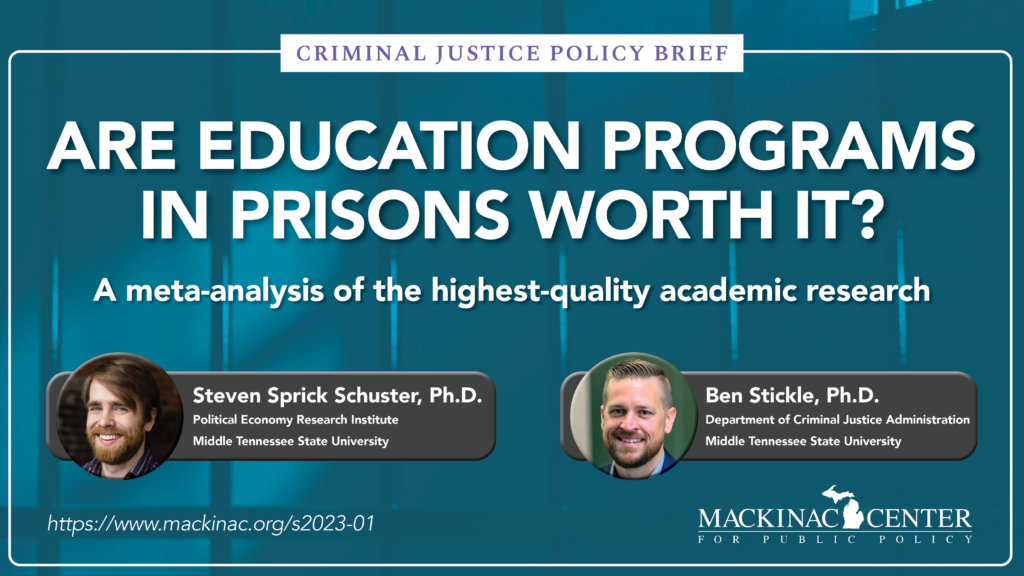
Are education programs in prisons worth it?
A meta-analysis of the highest-quality academic research
By Steven Sprick Schuster and Ben Stickle
January 2023
This report summarizes a meta-analysis of the highest quality research on the effects of education programs in prisons. It is based on a review of 750 research papers from which 78 were identified as being high-quality examinations of the effects of these programs. The results of the meta-analysis shows that prison education programs are a net positive, both for taxpayers and former prisoners. The best research shows that providing educational opportunities to incarcerated individuals reduces recidivism and boosts employment and income for participants.
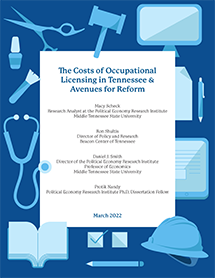
The Costs of Occupational Licensing in Tennessee and Avenues for Reform
By Macy Scheck, Daniel J. Smith, Ron Shultis, and Protik Nandy
March 2022
In this study we examine the effect of Tennessee’s occupational licensing policies and estimate its effect on the local economy, with the hope of further enhancing the state’s reputation for fostering a friendly and open business environment, while still protecting consumers. Currently, Tennessee ranks 13th in terms of most broad and onerous licensing requirements, according to the Institute for Justice. This includes a total of 263 occupations, which comprises 30 percent of the state’s workforce, or over one million Tennesseans. From these numbers, we conservatively estimate initial costs of occupational licensure to total over $279 million. Additionally, we conservatively estimate that annual renewal costs for occupational licensing in Tennessee to be nearly $38 million.
To reduce this drag on the state’s economy, policymakers should pursue four objectives. First, occupational licensing should be substantially curtailed or eliminated on low-income professions to end unnecessary restrictions on occupational choice and economic mobility for low-income Tennesseans. Second, Tennessee should eliminate occupational licensing for professions with no measurable and realistic threat to consumer safety. Next, policymakers should strictly control the extension of occupational licensing to new professions. Finally, by improving public access to data on licensed occupations, researchers can better measure the costs and burdens of licensure and how many Tennesseans are affected by it. Following these four steps will help ensure that the state of Tennessee is better situated to foster economic prosperity for all its citizens.
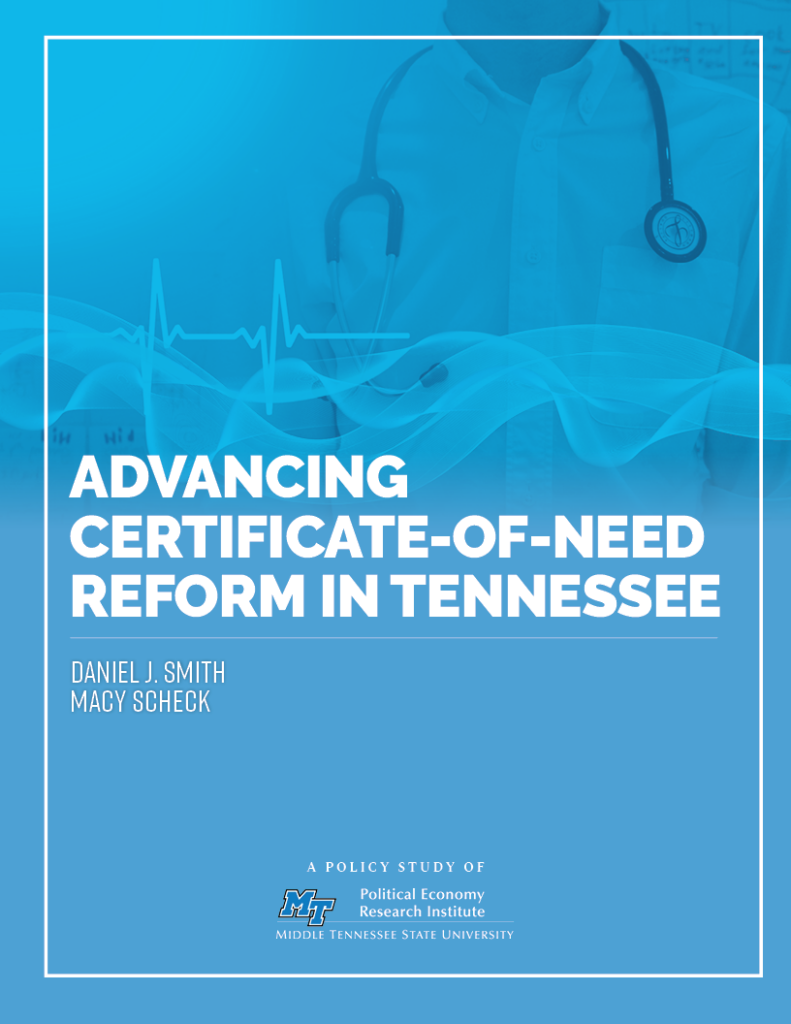
Advancing Certificate-of-Need Reform in Tennessee
By Daniel J. Smith and Macy Scheck
December 2021
The modern aim of certificate-of-need laws is to decrease healthcare costs, improve healthcare quality, and increase access to healthcare by restricting healthcare expenditures. But, by empowering incumbent healthcare providers to restrict competition, they can also increase healthcare costs, decrease quality, and decrease access to healthcare. This paper reviews the evidence on the effectiveness of CON laws and finds that they overwhelmingly tend to fail to achieve their stated ends. Furthermore, most healthcare services covered by CON laws in Tennessee lack convincing empirical justification, especially taking into consideration the possibility for heightened demand for healthcare facilities in response to global pandemics, natural disasters, and acts of terrorism. Tennessee policymakers can improve healthcare cost, quality, and access for Tennesseans, and help Tennessee prepare for future pandemics, by further reforming CON laws. This paper reviews a range of possible reforms from complete removal of CON laws to the adoption of healthcare facility licensing.
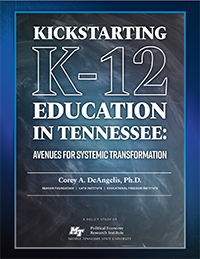
“Kickstarting K-12 Education in Tennessee: Avenues for Systemic Transformation”
By Corey A. DeAngelis, November 2020
Although the state has recently taken some steps in the right direction when it comes to education policy, Tennessee’s math and reading assessments indicated that only 36 percent of students performed at or above grade level in the 2018-19 school year.” In his research, Dr. DeAngelis finds “the state could provide schools with stronger incentives to spend K-12 education dollars wisely” through a variety of proposed methods, including an expansion of access to public charter schools and private school choice programs. “These types of educational options could improve student outcomes while empowering families. The education policy study and related webinar event is made possible by the generous support of Jay and Jackie Archer, and Cyndi and Dr. Tracy Miller.
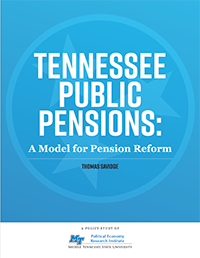
Tennessee Public Pensions: A Model for Pension Reform
By Tom Savidge, August 2020
Tennessee’s public pension system recent reforms passed in 2014 have helped make Tennessee one of the best public pension systems in the United States. This paper will first examine the reforms made by Tennessee. The sections that follow will examine how Tennessee’s public pension plans have fared compared to other states that have made reforms (i.e. Michigan and Wisconsin) and states where no reforms to defined benefit pension plans have been made (i.e. Alabama, Connecticut, and Illinois) in terms of contribution rates, funding ratios, and liability valuations. The second part of this paper will make recommendations for future reform that will help keep Tennessee one of the most competitive public pension plans in the United States. https://jewlscholar.mtsu.edu/handle/mtsu/6292
Books
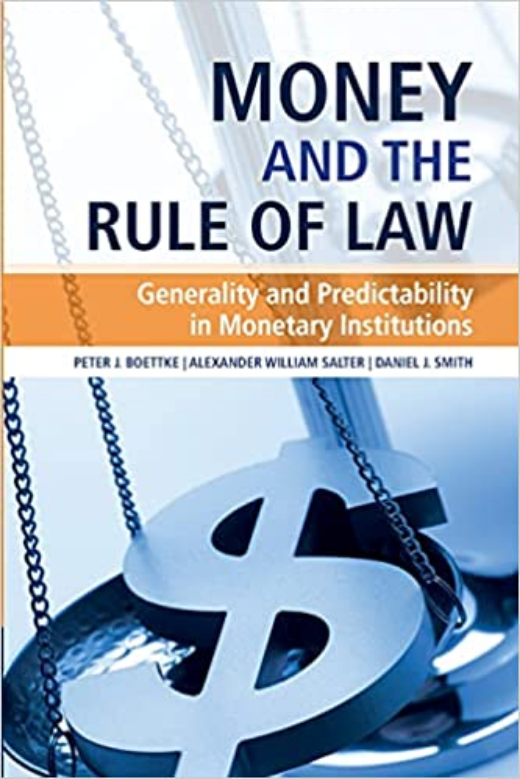
Money and the Rule of Law: Generality and Predictability in Monetary Institutions
By Peter J. Boettke, Alexander William Salter, and Daniel J. Smith, 2021
Contemporary monetary institutions are flawed at a foundational level. The reigning paradigm in monetary policy holds up constrained discretion as the preferred operating framework for central banks. But no matter how smart or well-intentioned are central bankers, discretionary policy contains information and incentive problems that make macroeconomic stability systematically unlikely. Furthermore, central bank discretion implicitly violates the basic jurisprudential norms of liberal democracy. Drawing on a wide body of scholarship, this volume presents a novel argument in favor of embedding monetary institutions into a rule of law framework. The authors argue for general, predictable rules to provide a sturdier foundation for economic growth and prosperity. A rule of law approach to monetary policy would remedy the flaws that resulted in misguided monetary responses to the 2007-8 financial crisis and the COVID-19 pandemic. Understanding the case for true monetary rules is the first step toward creating more stable monetary institutions.
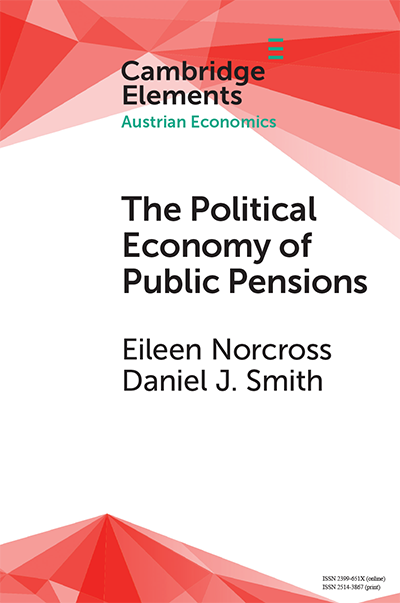
The Political Economy of Public Pensions
By Daniel J. Smith and Eileen Norcross, 2021
Public pensions in the United States face an impending funding crisis in the wake of the Financial Crisis and the COVID-19 Recession. Many cities and states will struggle to meet these growing obligations without major cuts in government services, reneging on pension promises, or raising taxes. This monograph examines the development of the pension crisis through the lens of political economy. We analyze the knowledge and incentive problems inherent in the institutional structure, governance, and accounting of public pensions. We conclude by offering several institutional, governance, and reporting reforms to the pension funding crisis.
Referred Journal Articles
- Sprick Schuster, Steven (PERI); Jaremski, Matthew; and Fleitas, Sebastian. (2023) “The U.S. Postal Savings Banks System and the Collapse of B&Ls During the Great Depression“. Southern Economic Journal.
- Sprick Schuster, Steven (2023) “The Persuasive Power of the Fourth Estate: Estimating the Effect of Newspaper Endorsements 1960-1980” Journal of Economic Behavior & Organization.
- Smith, Daniel J. and Benzecry, Gabriel F. (2023) “Not-So-Spontaneous Socialization Outcomes of Spontaneous Family Structures“. Cosmos + Taxis: Studies in Emergent Order and Organization, forthcoming.
- Smith, Daniel J. (2023) “Austrian Economics as a Relevant Research Program.” The Review of Austrian Economics, forthcoming.
- Smith, Daniel J. and Benzecry, Gabriel F. (2023) “The Wisdom of Classical Political Economy in Economics: Incorporated or Lost?“. The Review of Austrian Economics, forthcoming.
- Al-Bawwab, Rania (2023) Zakat: changing the framework of giving. Islamic Economic Studies.
- Benzecry, Gabriel F. (2023) The Political Thought of José Osvaldo de Meira Penna. Journal of Libertarian Studies
- Smith, Daniel J. and Hogan, Thomas L. (2022) “War, Gold, & the U.S. Economy: Performance of the Federal Reserve and the Gold Standard,” (with Thomas L. Hogan). The Review of Austrian Economics 35(1) 2022: 15-37.
- Piano, Ennio E. (2021). Organizing high-end restaurants. Economics of Governance, forthcoming.
- Piano, Ennio E. (2021). In persona Christi Capitis: Agency problems when God is the principal. Journal of Economics, Management, and Religion, forthcoming.
- Piano, Ennio E., and Al-Bawwab, Rania (2021). The artist as entrepreneur. Review of Austrian Economics, forthcoming.
- Nipper, Ashley B.; Waymire, Tammy R. (2021) Government Audit Quality and Efforts to Improve Internal Controls: A Case Study in Tennessee
(Journal of Government Financial Management, 69 (4). - Smith, Daniel J. and Al-Bawwab, Rania. “Breaking Bad: Public Pensions and the Loss of that Old-Time Fiscal Religion,” The Independent Review: A Journal of Political Economy, 25(1) 2020.
- Leeson, Peter T., and Piano, Ennio E. (2020). The Golden Age of Mercenaries. European Review of Economic History, forthcoming.
- Piano, Ennio E. (2020) “Coase goes to war: Contract choice on the battlefield.” Revue d’Economie Politique, forthcoming.
- Piano, Ennio E., and Salter, Alexander W. (2020). The fundamental Coase of development: Property rights foundations of the effective state. Journal of Institutional Economics, forthcoming.
- Rouanet, Louis, and Piano, Ennio E. (2020). Filling the ranks. European Review of Economic History, forthcoming.
- Piano, Ennio E. (2020). Desertion as theft. Journal of Institutional Economics, 16(2), 169-183.
- Piano, Ennio E., and Carson, Trey. (2020). Scalp-taking. Rationality and Society, 32(1), 40–66.
- Smith, Daniel J.; Crowley, George R.; Leguizamon, Sebastian J. (2020). Long Live the Doge? Death as a Term Limit on Venetian Chief Executives. Public Choice, forthcoming.
- Smith, Daniel J. (2018) Turn-taking in Office. Constitutional Political Economy, Forthcoming
- Smith, Daniel J. (2018) “Central Banking without Romance,” (with Thomas L. Hogan and Robin P. K. Aguiar-Hicks). European Journal of Comparative Economics
Working Papers
- “Examining the Public Interest Rationale for Regulating Whiskey with the Pure Food and Drugs Act” by Macy Scheck and Daniel J. Smith
- “Economic Freedom Matters a Lot More for Economic Development than You Think!” by Sean-Patrick Alvarez, Macy Scheck, and Vincent Geloso.
- “Testing the Lange-Lerner Hypothesis: Does a Monopolized Banking Sector Undermine Democracy?” by Nicholas Reinarts, Gabriel Benzecry, and Daniel J. Smith.
- “You Have Nothing to Lose but Your Chains? Re-examining the Hayek-Friedman Hypothesis on the Relationship Between Capitalism and Political Freedom” by Nicholas Reinarts, Gabriel Benzecry, and Daniel J. Smith.
- “Examining the Public Interest Rationale for Regulating Whiskey with the Pure Food and Drugs Act” by Macy Scheck and Daniel J. Smith.
- “The Itch to Regulate: The Political Economy of U.S. Barber Licensure in the Progressive Era” by Sean Patrick Alvarez, Macy Scheck, and Daniel J. Smith.


